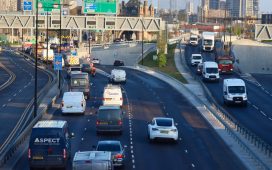Flowers and tributes lay at the scene where baby Ciaran Lee Morris was killed in Brownhills High … [+]
A British study has discovered that humans have an in-built acceptance of the risks and harms from motorists that they would not accept in other parts of life.
Calling this car blindness “motonormativity,” the researchers from Swansea University and the University of the West of England believe these unconscious biases have policy implications.
When a policymaker assumes that traveling from one place to another will involve driving, they might harm public health by trying to make driving easier, says the team.
This blind spot might create policies that increase air pollution and make travel more difficult and dangerous for all the people who move by other means.
“If you asked a politician whether a new hospital should be inaccessible to one-fifth of the population, obviously they’d say no,” said Professor Alan Tapp of the University of the West of England.
“Whereas if you asked that same politician whether a hospital should be built on the edge of town, it’s likely that many wouldn’t see the problem if they have a form of this mindset we’re looking at.
“But in practice, having the hospital outside town is not that different from making it inaccessible when a fifth of households don’t have a car.
“We regularly see policy decisions—from the location of amenities to the design of streets—that overlook the needs of people who aren’t driving, often forcing them to make longer journeys or place themselves in danger for the convenience of people who are driving. We suggest that these shared assumptions demonstrated in our study, which we called ‘motonormativity’, are a big part of the reason that such problems don’t get noticed.”
Study co-author Professor Ian Walker from Swansea University added:
“It is nonsensical to say that making people breathe toxic air is a problem when it comes from a cigarette, but it is fine when it comes from a car. The underlying principle is the same, but people in our study were not using the same standards when they judged the two things.
“We saw something similar when it came to theft. If you leave your’ belonging in the street and they get stolen, only 37% of people think the police should do something about it. But if you leave your car in the street and it gets stolen, then 87% of people think the police should take action—even though the car is just one of your belongings.
“It’s long been suspected that people can slip unconsciously into using different standards when they think about driving, leading them to commit a fallacy known as special pleading. Our study was intended to reveal this phenomenon and show just how substantial these effects can be,” said Walker.
These differences came from changing just one or two words in the questions asked of study participants. An independent polling company carried out the questioning with 2,157 members of the public.
Randomly, each person got a set of questions about driving cars or an identical set of questions with one or two words changed so that they asked about the same underlying principles but didn’t mention driving.
People could go from agreeing with an idea to disagreeing with it based on whether or not it was framed as a driving issue.
For example, 75% of those asked agreed, ‘People shouldn’t smoke in highly populated areas where other people have to breathe in the cigarette fumes,’ but only 17% agreed when two words were changed so that the statement was ‘People shouldn’t drive in highly populated areas where other people have to breathe in the car fumes.’
A crash-damaged black Ford Focus which was found abandoned after two brothers aged six and two died … [+]
“If all you’ve ever known is a world where the needs of motorists come first, there’s a good chance you’re going to start to understand that is the ‘normal’ or even the ‘proper’ way of things,” said study co-author Dr. Adrian Davis, also from the University of the West of England.
“When we pulled out just the people in our survey who didn’t drive, we saw that even these people were using different standards when the questions asked about driving. Their answers tended to echo what the drivers were saying, meaning it’s not even simple self-interest at work. It’s got to be something deeper, rooted in our culture.”
In their paper ‘Motonormativity: How social norms hide a major public health hazard,’ the team says that we are all surrounded by environments that promote motor travel and systematically downplay the negative consequences. These environments range from pelican crossings that make pedestrians wait for permission to cross the road while drivers automatically get a green light to advertising and media that normalize and excuse antisocial and dangerous driving.
The researchers say decision-makers should start recognizing their unconscious biases on this topic and implement systems to make transport decision-making more rational.
“Every decision maker needs to get used to asking themselves, ‘What’s the underlying principle we’re considering here, and would I still be happy with it if we were talking about something other than road transport?’” said Professor Walker.
“There are many dimensions to our dependence on the car relating to social practices, infrastructure, the political economy, and so on,” agreed Dr. Giulio Mattioli of the Urban Development Research Group at Germany’s TU Dortmund University, who was not involved with the study but called it “enlightening.”
“This interesting paper sheds light on the more cognitive dimension of car dependence, which is equally important,” said Mattioli.
“A key reason why many people still support car-dependent transport systems is that they see them as natural, inevitable and without alternatives, and normatively neutral. A very interesting finding of this study is that this does not seem to differ particularly between drivers and non-drivers.”









